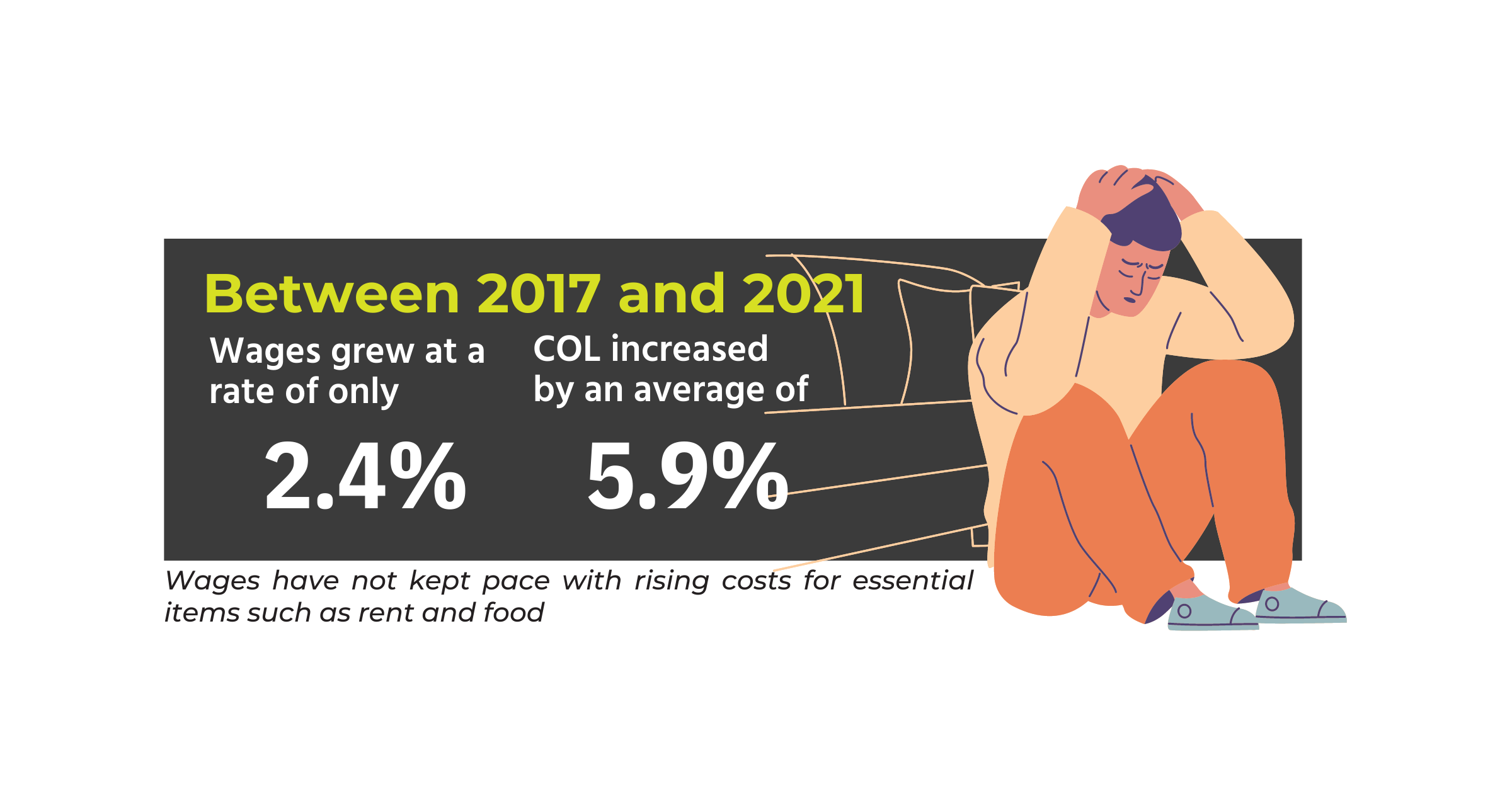The cost of living in Aotearoa New Zealand has been on the rise for years. For many people, this means cutting back on expenses wherever possible and trying to make the most of their income. This trend is particularly concerning given that low-income earners are likely to be hit hardest; those on lower incomes have fewer resources to draw from and may struggle to make ends meet. As such, it is important to identify ways apart from budgeting and cost cutting that tackles this problem from a system based level.
What is the cost of living?
The cost of living is an economic measure used to assess the relative value of goods and services in a given area, or country. This is typically accomplished through the use of either the Consumer Price Index (CPI) or Cost of Living Index (COLI). The CPI measures changes in prices for consumer goods over time, while COLI considers geographical factors and local economic conditions.
As per the latest figures released by Stats New Zealand (2022a), the year-on-year increase in CPI of New Zealand was 7.2%. In fact, the CPI of New Zealand has been increasing since the last five years. For example, the average year-on-year change in CPI in New Zealand was 1.6% in the years 2017-2020. It increased steadily since 2021 and stood at 3.7% in 2021 and currently stands at 7.2% in 2022 (Stats New Zealand, 2022a).
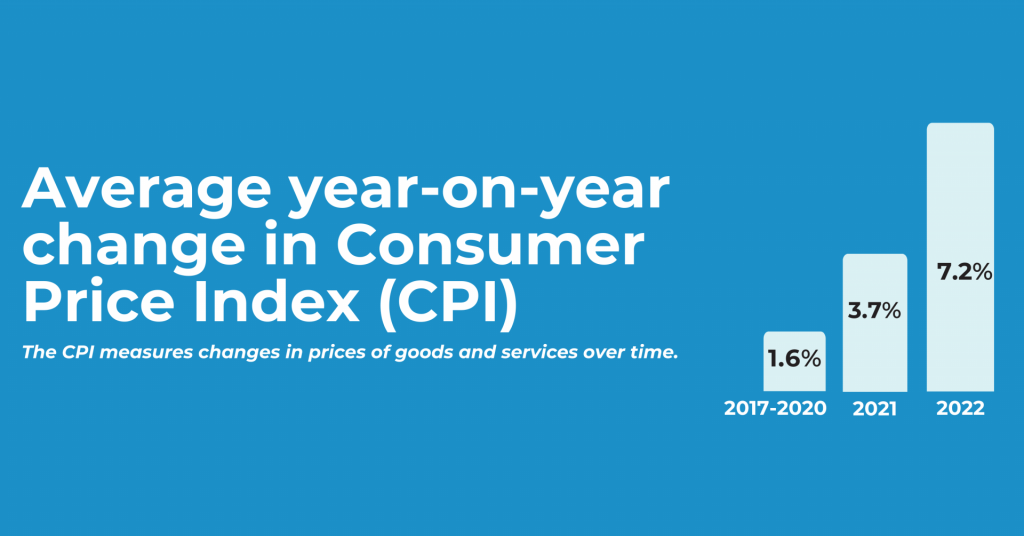
How does the cost-of-living impact New Zealanders?
The cost of living in Aotearoa New Zealand has increased significantly over the last five years, driven largely by escalating housing costs. Data from the Real Estate Institute of New Zealand (REINZ) showed that median house prices have increased 96%, from $350,000 to $685,000 since 2010-2020, (Dickinson, 2020) – making home ownership unaffordable for many Kiwis due to stagnant wages and high debt levels.
Rental prices have also risen, with average weekly rent increasing 84.3% since June 2007 (Stats New Zealand, 2022b). According to Stats New Zealand, the annual cost of living measured as the household living-costs price indexes increased 5.2% in December 2021 as compared to the same period last year. It costs an average of NZ$3000-NZ$4000 per month for a single adult to maintain standard of living in a major city in New Zealand – covering essential expenses such as housing, transport, food and drink, clothing and car running costs.
The cost of living varies depending on location, with Auckland having the highest cost of living in the country, with households needing an average of NZ$7,984 per month (Wise Move, n.d.). Rent costs make up a large portion of this expenditure – with average weekly rent costing in Auckland sitting at NZ$450, which is higher even than the country’s average weekly rent cost of NZ$340 as per 2018 census (Stats New Zealand, n.d.). Energy costs have also risen significantly since 2008, with electricity and gas prices jumping 28.7% – further driving up the cost of living (Stats New Zealand, 2021).
Consequently the expensive cost of living has led to premiums for foreign goods and services, affecting food prices the most; grocery items on average increased 1.2%, while fresh fruit and vegetables rose 5.9% in December 2022 as compared to November 2022. Subsequently low-income earners are disproportionally affected by these increasing prices, unable to purchase healthier options they would otherwise be able to afford.
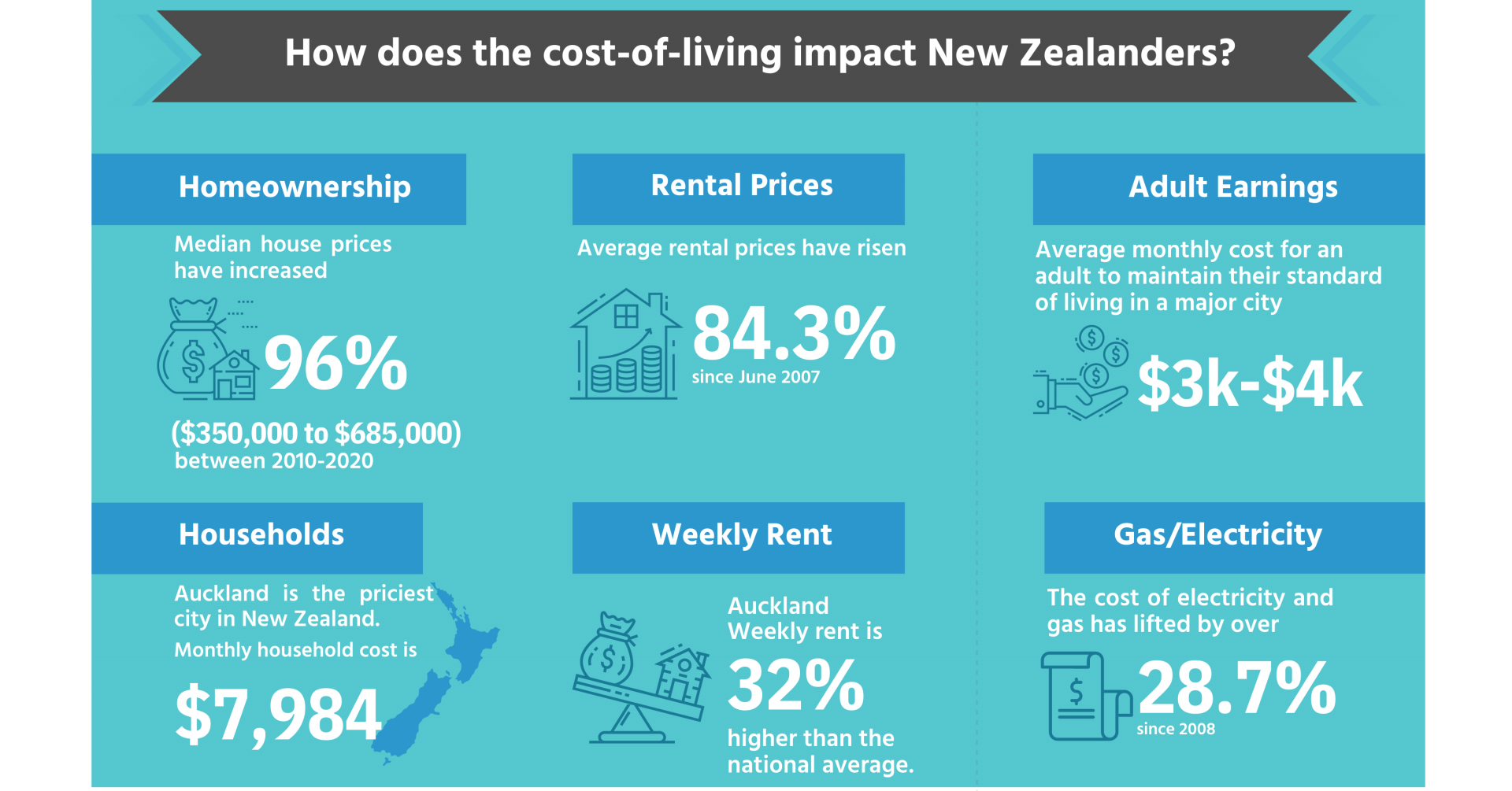
Unfortunately, wages have not kept pace with rising costs for essential items such as rent and food. Figures from Statistics NZ show that between 2017 and 2021, wages rose by only 2.4% per annum whereas the consumer price index (CPI) increased on average 5.9% annually over this period – meaning that many households are faced with lower disposable income due to stagnant wages failing to keep up with increasing prices.
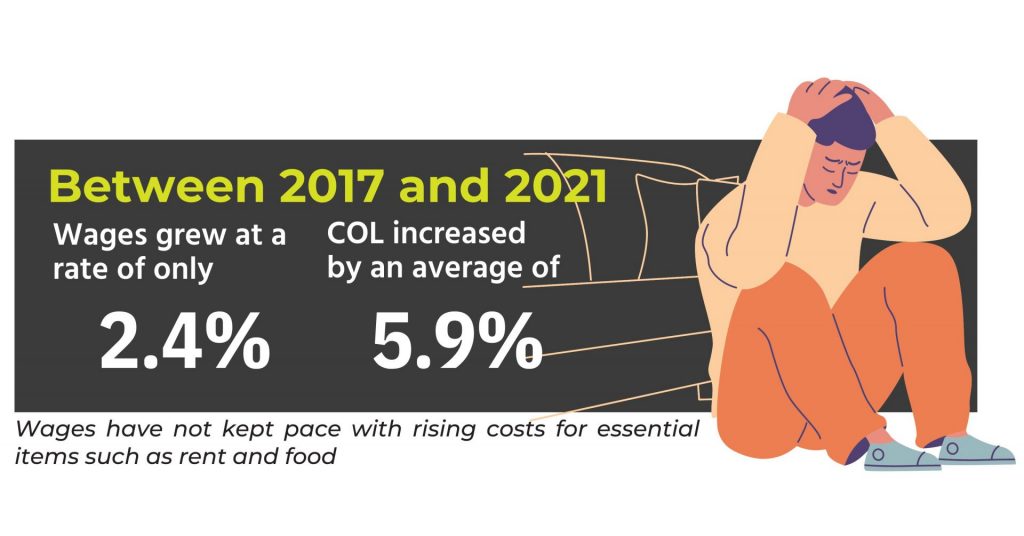
Effects of increased cost of living on health and well-being.
The cost of living in New Zealand has a significant impact on health and wellbeing. Research from the Southern Cross (2022) found that higher cost of living of New Zealand was affecting physical and mental wellbeing of New Zealanders by bringing changes in wellbeing behaviours such as changes in eating habits, interruptions to sleep, and exercise habits.
Financial strain caused by high costs can lead to poor dietary choices due to inadequate nutrition. A report from Te Pou o te Whakaaro Nui identified that 29% percent had reduced their spending on food or changed their eating habits due to financial constraints (Te Pou o te Whakaaro Nui, 2019). Access to healthy food options may be challenging due to the cost, which can lead to poorer health outcomes.
Additionally, high costs of living can hamper access to quality healthcare services. In New Zealand, both prescription medications and cost-sharing for primary care services can incur a financial burden on individuals, potentially leading to avoidance or postponement of medical treatment (Ministry of Health, 2019). Such delays in seeking medical help could adversely affect physical and mental health.
3 controversial policy based solutions
The cost of living is directly linked to policies implemented by governments, as they have the power to control certain aspects that can affect the cost of basic goods and services (Kenton, 2022). This includes but is not limited to taxes, subsidies, incentives, investment in infrastructure and public transportation systems, development projects, labour laws, and more. These measures can result in either an increase or decrease in cost of living depending on their specific nature; some policies may be designed to reduce prices while others may raise them.
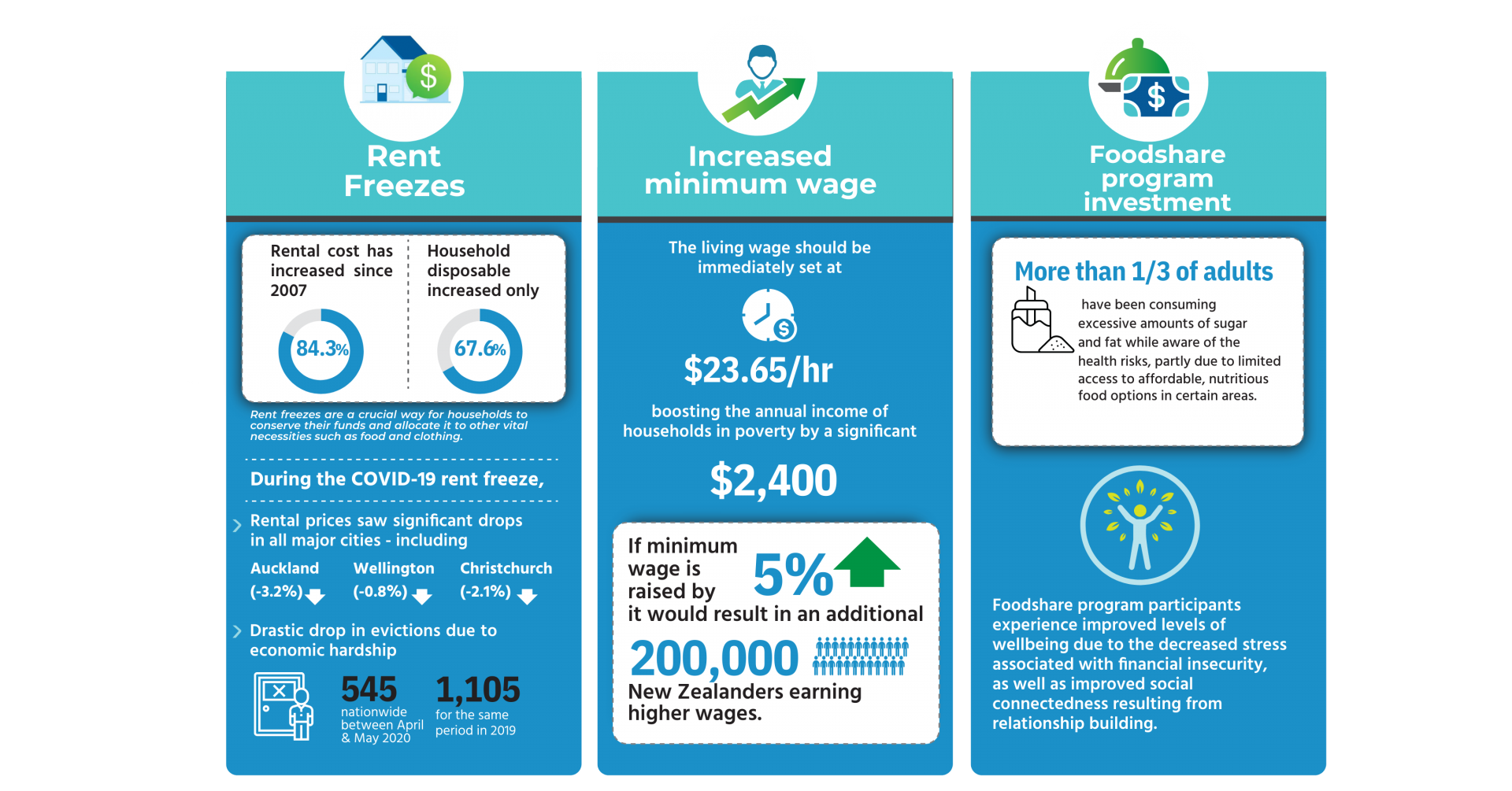
1. Rent freezes
Rent freezes are a form of rent regulation that involve limiting the amount landlords charge tenants in rental payments. These are used when economic conditions lead to higher housing costs, or when tenant rights need additional protection from landlord abuse. The idea behind them is to provide security and stability for tenants who would otherwise be unable to afford their current housing situation. As per Stats New Zealand (2022b), rental cost in New Zealand has increased 84.3% since 2007 whereas household disposable income increased only 67.6% over the same period. Rent freezes help households save money which can then be spent on other essential needs like food and clothing.
A recent example of this was during the COVID-19 pandemic where New Zealand implemented a rent freeze from March until September 2020. This temporarily removed landlords’ ability to raise rents and put in place strict limits on how much could be charged for existing tenancies which were below market value. The aim was to protect tenants from sudden, unaffordable rent increases during uncertain times. Data collected since the rent freeze has shown it as an effective measure in protecting tenants. Research conducted by Massey University (2021) revealed that rental prices had decreased since the introduction of the freeze in most parts of the country, with particularly large drops in Auckland (-3.2%), Wellington (-0.8%) and Christchurch (-2.1%). The data also reveals a decrease in evictions due to economic hardship since the implementation of the freeze – only 545 evictions nationwide between March and May 2020, compared to 1,105 evictions during the same period in 2019. This highlights the importance of rent freezes in providing economic security for tenants during difficult times.
2. Increased minimum wage
Raising the minimum wage is one policy that could help mitigate the cost of living in New Zealand. According to Living Wage Aotearoa (n.d.), the real living wage for Auckland should be set at $23.65 an hour – a figure significantly higher than the current national minimum wage of $21.20 per hour and which would yield approximately $2,400 more annually for households in poverty. Furthermore, raising the minimum wage would not only reduce inequality among citizens but could also benefit both employers and employees by enabling individuals to cover basic needs without relying on government subsidies.
The Ministry of Business Innovation & Employment (MBIE, 2021) estimated that if the minimum wage of New Zealand is raised by 5 percent, it would result in an additional 200,000 New Zealanders earning higher wages. Although the cost of this increase is estimated to be around $350 million a year, research suggests that it would promote economic growth by increasing consumer spending and creating jobs. These effects could then lead to an upward pressure on wages throughout the economy. Therefore, raising the minimum wage may provide long term benefits for New Zealanders in terms of poverty reduction and overall economic stability.
3. Foodshare program investment
The New Zealand government could help to buffer the cost of living by increasing access to low-cost, healthy food options. A survey conducted by the Ministry of Health (2019) revealed that over 1/3 of adults were consuming unhealthy amounts of sugar and fat despite being aware of the health risks associated with such consumption. This is due in part to limited access to affordable, nutritious food options in certain areas and indicates a need for initiatives designed to provide healthier alternatives regardless of economic standing or geographical location. Programs such as Foodshare Auckland are examples of these initiatives; they provide discounted healthy meal boxes for those who cannot afford grocery store prices.
A 2016 evaluation of a New Zealand foodshare program found that participants experienced improved levels of wellbeing due to the decreased stress associated with financial insecurity, as well as improved social connectedness resulting from relationship building amongst participants (Mirossa et al., 2016). A 2015 research study further found that those who participated in these types of initiatives often felt empowered, leading to an increased sense of satisfaction and community ownership.
By increasing access to low-cost, nutritious food options, households can make healthier dietary choices without it negatively impacting their budget. Doing so will help ensure that all New Zealanders have access to healthy food options regardless of economic background or location.
Conclusion
The cost of living in New Zealand is an issue that must be addressed if we are to ensure a healthy and prosperous future for all. To combat this, the government should implement initiatives such as rent freezes, increased minimum wage and access to low-cost foods. These solutions will give citizens much needed economic security whilst also promoting economic growth through increased spending and job creation. Doing so will help reduce poverty levels throughout the country, as well as create healthier communities by giving individuals access to affordable nutritious food options.
References
Dickinson, P. (2020, October 19). ‘A bad thing’: Property prices doubling every 10 years increases inequality – expert. Newshub. https://www.stats.govt.nz/news/housing-costs-rise-impact-felt-strongly-by-renters/
Kenton, W. (2022, July 2). Price controls explained: Types, examples, pros & cons. Investopedia. https://www.investopedia.com/terms/p/price-controls.asp
Living Wage Aotearoa (n.d.). Living wage rises to $23.65 an hour in September. Living Wage Aotearoa. https://www.livingwage.org.nz/living_wage_rises_to_23_65
Massey University. (2021). Residential market report: Rental report September 2021. https://mro.massey.ac.nz/bitstream/handle/10179/17072/New%20Zealand%20Residential%20Market%20Report%202021%20Sep.pdf?sequence=1&isAllowed=y
Ministry of Business, Innovation & Employment [MBIE]. (2021). Minimum wage review 2021. https://www.mbie.govt.nz/dmsdocument/18690-minimum-wage-review-2021
Ministry of Health. (2019). Methodology report 2018/19: New Zealand Health Survey. Ministry of Health. https://www.moh.govt.nz/notebook/nbbooks.nsf/0/38A0B04E793F5F1ECC257DC60008B736/$file/methodology-report-2018-19-new-zealand-health-survey-nov19.pdf
Mirosa, M., Mainvil, L., Horne, H., & Mangan-Walker, E. (2016). The social value of rescuing food, nourishing communities. British Food Journal, 118(12), 3044-3058. http://hdl.handle.net/10523/10818
Southern Cross. (2022). Healthy futures report 2022: Shining a light on New Zealand’s health and wellbeing. Southern Cross. https://www.southerncross.co.nz/-/media/landing-pages/healthy-futures/SouthernCrossHealthyFuturesReport.pdf
Stats New Zealand. (2022, April 21). Consumers price index: March 2022 quarter. Stats New Zealand https://www.stats.govt.nz/information-releases/consumers-price-index-march-2022-quarter/
Stats New Zealand. (2021, August 18). Increase in power prices drives June 2021 quarter producers price indexes higher. Stats New Zealand. https://www.stats.govt.nz/news/increase-in-power-prices-drives-june-2021-quarter-producers-price-indexes-higher/
Stats New Zealand. (2022b, February 24). Housing costs rise, impact felt strongly by renters. Stats New Zealand https://www.stats.govt.nz/news/housing-costs-rise-impact-felt-strongly-by-renters/
Stats New Zealand. (n.d.) Auckland region. Stats New Zealand. https://www.stats.govt.nz/tools/2018-census-place-summaries/auckland-region#weekly-rent
Te Pou o te Whakaaro Nui. (2019). Adult mental health and addiction workforce: 2018 secondary care health services. Auckland. https://d2ew8vb2gktr0m.cloudfront.net/files/resources/MTN-summary-workforce-report-2018.pdf
Wise Move. (n.d.). The cost of living in New Zealand [2023]. https://www.wisemove.co.nz/post/the-cost-of-living-in-new-zealand

